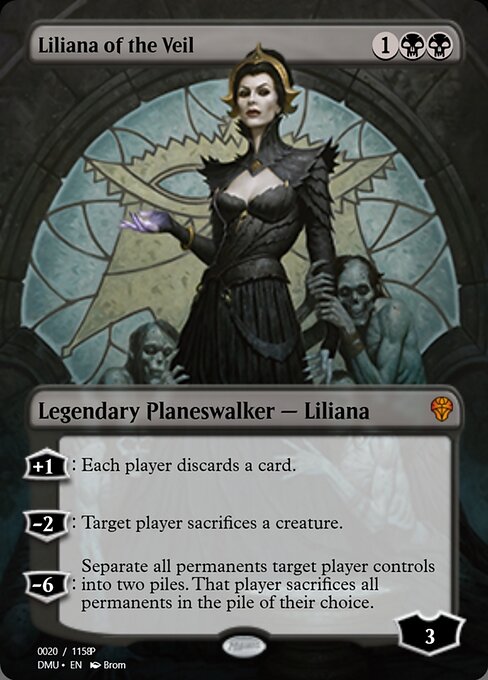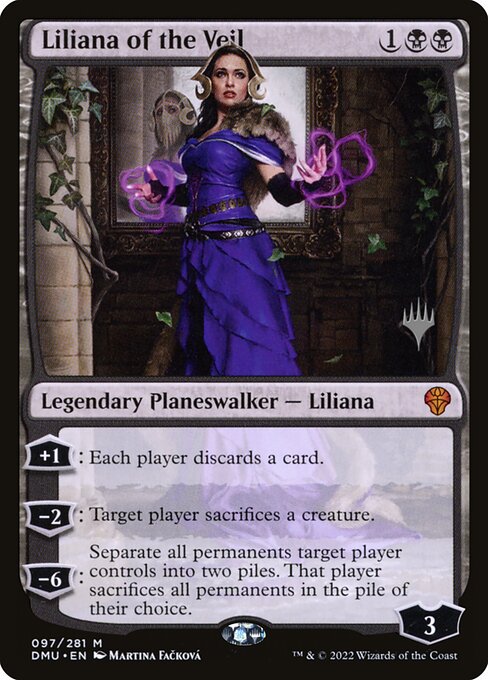Let’s start with a weird word: tmesis. It’s a Greek word used in rhetorical studies meaning “a cutting.” It describes ways of writing or speaking that go something like, “Abso-friggin-lutely.” Or: “Do I want–hell yes!–to go?” One cuts into the word or phrase they’re speaking/writing and inserts something else before suturing it back up. Good times. Why do I mention it? Because it’s a favorite rhetorical move and one that I see reflected in certain black cards I play, especially the lovely Liliana of the Veil.
Tmesis means cutting something in half. In writing and rhetoric, one can use tmesis as a way to instigate an idea. Or adorn and vivify writing. To slow a reader down or make a listener may more attention to a word or moment. And in Magic, I find tmesis mapping over certain black qualities. Discard. Removal. Sacrifice. Exile. The point of a tmesis-via-Magic is to scare the opponent into thinking they have no inventive capabilities. That is, to convince them they have no forward momentum, no story for their own deck to tell. It is a severing of their consistency. To do the inverse of what rhetorical tropes and schemes are for: to help invent or adorn.
I don’t have a strong relationship to planeswalkers. In fact they bore me. (Bring on the hate.) There are lots of them, as my fellow Hipster Rob Bockman recently pointed out. And many have repetitive or not interesting enough abilities. There is, however, Liliana of the Veil.

Lili is a song. A song made of onyx scalpels shot through your boardstate. I have never had a card so quickly targeted after I cast it. And, I admit, for good reason. She’s a powerhouse. Since her reprinting in Dominaria United, I’ve heard players dog the card’s abilities as no longer “good” or “appropriate” for Modern (and better in Pioneer) or whatever blah blah. Forget those naysayers. She’s great everywhere.
Maybe over and above everything else, I appreciate the simplicity of her abilities’ language.
+ 1: Each player discards a card.
−2: Target player sacrifices a creature.
−6: Separate all permanents target player controls into two piles. That player sacrifices all permanents in the pile of their choice.
No nonsense destruction. Further, I admire the combination of all the most essential black qualities. Universal discard. The edict. And the ultimate for Lili–the absolute devastation of an opponent’s boardstate. She is tmesis made into a cardboard bomb. She splits the hand. Splits the board. Splits the whole game. And in that ult, “separate” comes from Latin and means “divided.” The design of the card is conspiring to section an opponent. And what is a veil but a separation between the face and the world? If I wanted to take this even further–and I most certainly do–I’d look at the etymology of her name. “Liliana” comes from the Latin “lilium”–the lily flower, the flower most associated with funerals and death. The living flower that quickly turns sour and foul when it begins to spoil.

Oddly, even though what I said at the top of the article stands, I didn’t feel like I was actually playing Magic: The Gathering until I pulled a Liliana of the Veil as my rare/mythic foil in my Dominaria United prerelease box. To be fair, that one card, in that one moment, is what urged me to keep playing. And to keep playing black. To keep my playing knife simple: discard, removal, sacrifice. Abso-friggin-lutely.
Kyle Winkler (he/him) is a teacher and fiction writer. While he was pre-teen when Magic: The Gathering was released, he didn’t start playing until recently. He’s the author of the cosmic horror novella (The Nothing That Is), a collection of short stories (OH PAIN), and a novel (Boris Says the Words). His favorite card is a toss up between Crypt Rats and Oubliette.

